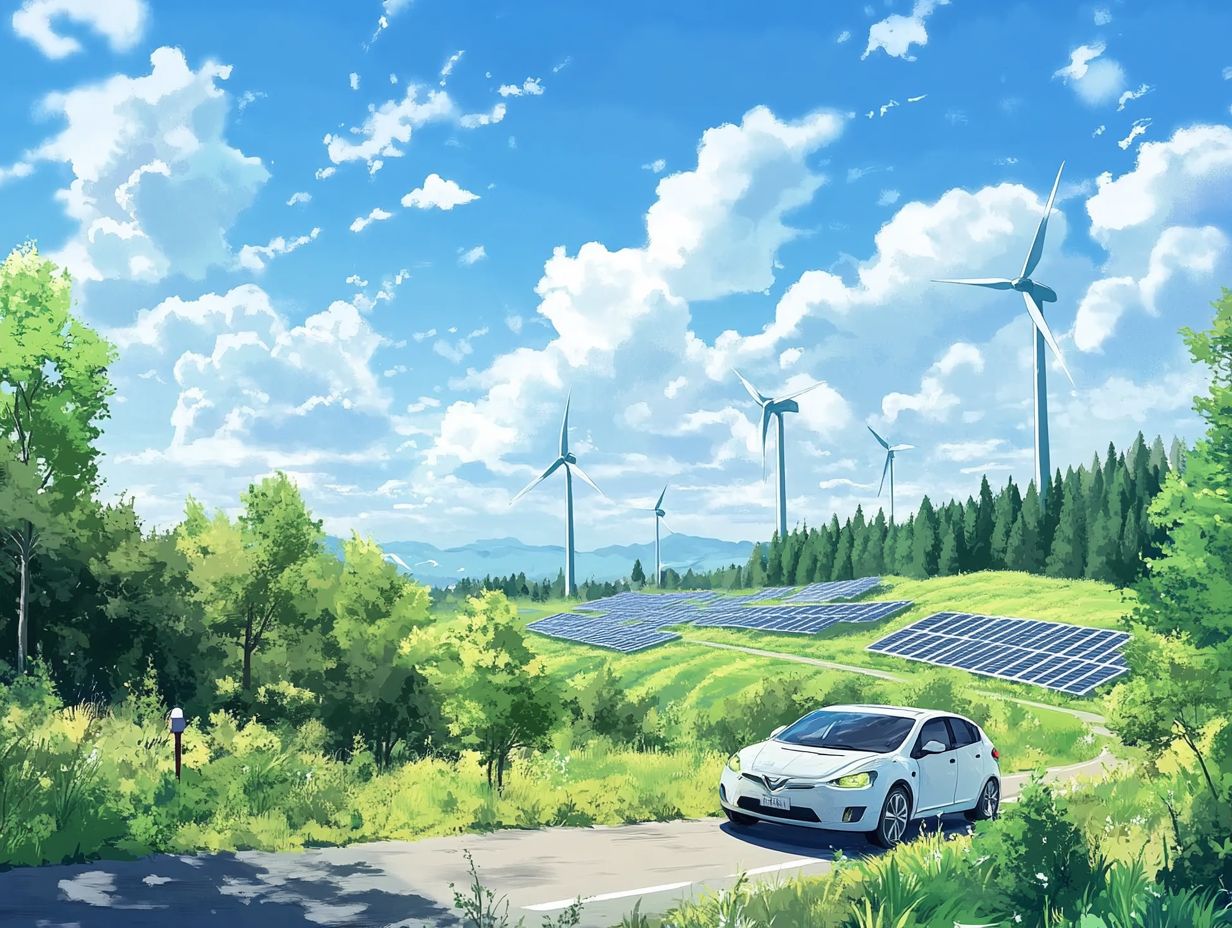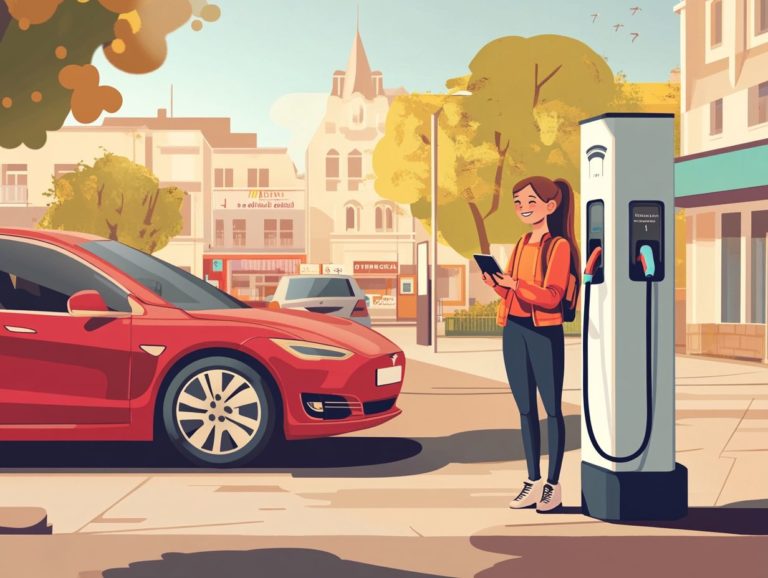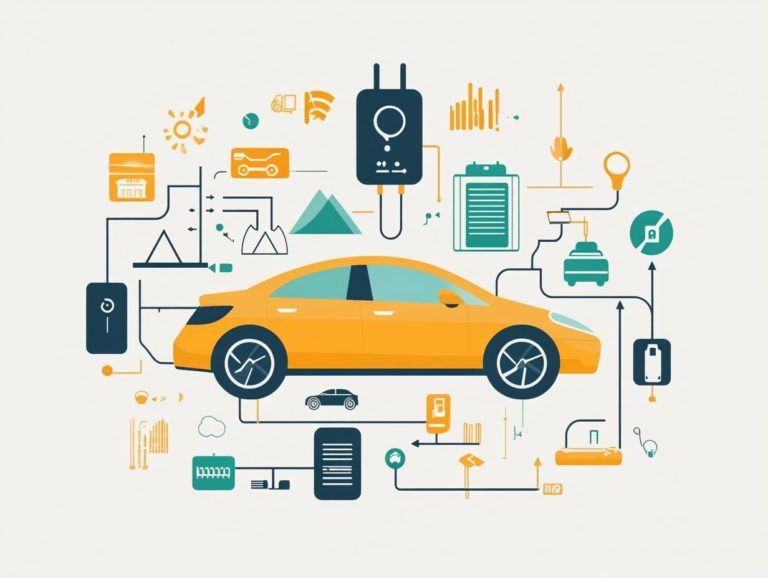the environmental impact of electric vehicles
Electric vehicles (EVs) are revolutionizing the roads and redefining what we consider sustainable transportation.
This article delves into the environmental impact of EVs, emphasizing their crucial role in lowering greenhouse gas emissions and enhancing air quality.
You ll find a comparison between these groundbreaking vehicles and traditional gasoline and diesel cars, showcasing both the advantages and the hurdles EVs must overcome to achieve widespread acceptance.
From infrastructure challenges to government incentives, uncover the factors propelling the transition toward a cleaner automotive future.
Contents
- Key Takeaways:
- Environmental Impact of Electric Vehicles
- Comparing Electric Vehicles to Traditional Vehicles
- Challenges and Solutions for Widespread Adoption
- Frequently Asked Questions
- Curious about the environmental impact of electric vehicles?
- How do electric vehicles reduce emissions?
- Do electric vehicles have a lower carbon footprint?
- What is the impact of electric vehicles on air pollution?
- Are there any environmental concerns related to electric vehicles?
- How do electric vehicles contribute to sustainability?
Key Takeaways:

- Electric vehicles cut greenhouse gas emissions and help fight climate change.
- They have a lower environmental impact than traditional vehicles.
- Government incentives can promote the adoption of electric cars.
What are Electric Vehicles?
Electric vehicles (EVs) represent a transformative leap in the transportation landscape. They use electric motors mainly powered by clean energy instead of traditional fossil fuels.
These innovative vehicles come in various forms, including fully electric and plug-in hybrids. Each is designed to reduce your reliance on gasoline cars while minimizing carbon emissions and tailpipe pollutants that contribute to greenhouse gases.
At the heart of EV technology lies the battery. These batteries use advanced materials like lithium and cobalt, which help make them more efficient and long-lasting, delivering impressive ranges and shorter charging times.
Compared to their gasoline counterparts, electric vehicles offer numerous advantages. These include lower operating costs, enhanced energy efficiency, and a significant reduction in noise pollution.
Government incentives and subsidies play a crucial role in encouraging the adoption of EVs. They shape the perception that these vehicles are not only environmentally friendly but also economically sensible.
Awareness campaigns aim to educate you on the long-term benefits, further solidifying electric vehicles as a practical choice for the eco-conscious driver.
Environmental Impact of Electric Vehicles
The environmental impact of electric vehicles is an important point as you switch from traditional gasoline cars to a more sustainable transportation model, particularly when considering the impact of electric vehicles on climate change.
These vehicles offer the promise of significant reductions in greenhouse gases and carbon emissions. This ultimately results in a smaller carbon footprint.
By harnessing renewable energy sources, electric vehicles play a vital role in creating a more sustainable energy mix. This aligns with the goals set by the Department of Energy and the EPA to combat climate change.
Reducing Greenhouse Gas Emissions
Electric vehicles are crucial in the fight against greenhouse gas emissions. They offer a way to significantly lower carbon output compared to traditional gasoline cars.
This shift is essential for tackling the pressing challenges of climate change and carbon pollution. The magic lies in the efficiency of electric motors and the opportunity to charge these vehicles using renewable energy sources.
According to the U.S. Environmental Protection Agency (EPA), electric vehicles emit about 45% less carbon dioxide over their lifetime compared to conventional vehicles, even when factoring in emissions from electricity generation.
A study by the Union of Concerned Scientists indicates that as the electrical grid becomes greener with more renewable energy sources, emissions from electric vehicles will continue to decrease.
On the flip side, traditional internal combustion engines release substantial amounts of CO2, alongside harmful pollutants like nitrogen oxides and particulate matter. These degrade air quality and pose public health risks.
By making the switch to electric vehicles, you have the power to significantly cut down these harmful emissions! Join the movement towards a cleaner, greener world today!
Impact on Air Quality
The adoption of electric vehicles can significantly enhance air quality, especially in urban areas. By virtually eliminating tailpipe emissions those harmful byproducts from gasoline and diesel cars you can directly combat air pollution.
This shift contributes to the fight against climate change. As electric vehicles increasingly replace fossil fuels in transportation, you’ll notice a reduction in harmful pollutants.
Numerous studies highlight this connection. Cities with higher electric vehicle usage tend to see clear drops in nitrogen oxides and tiny particles in the air that can harm health.
For example, a study published in Environmental Science & Technology revealed that regions investing in electric vehicle infrastructure experienced a remarkable 30% decrease in air pollutant concentrations over a decade.
This significant reduction not only enhances residents’ quality of life by decreasing respiratory and cardiovascular issues but also lessens long-term environmental effects linked to climate change. Cleaner air metrics are connected to greater community engagement and productivity.
This creates a healthier and more vibrant urban environment for everyone.
Resource Usage and Sustainability

While electric vehicles bring substantial environmental benefits, consider the resource usage tied to battery manufacturing, especially lithium and cobalt. These issues raise important sustainability concerns that must be addressed.
The entire lifecycle of electric vehicle batteries from extraction to recycling plays a crucial role in evaluating their overall impact on sustainability. As demand for electric vehicles skyrockets, the pressure to extract these essential resources increases.
This often leads to deforestation, water depletion, and significant carbon emissions at extraction sites. The industry now faces a crucial challenge: balancing rapid growth with sustainable practices.
Emerging recycling technologies present a compelling solution, allowing the recovery of valuable materials and reducing the need for new extraction. Mining companies are increasingly adopting eco-friendly extraction methods.
This shift is driven by regulatory pressures and growing consumer demand for sustainable products. This focus on sustainable practices and tech innovation is key to a healthier future!
Comparing Electric Vehicles to Traditional Vehicles
When you compare electric vehicles to traditional gasoline cars, you’ll find significant differences in carbon emissions, reliability, and the overall cost of ownership.
These distinctions make electric vehicles an appealing choice for daily travel needs. Understanding these nuances is vital for anyone considering a shift toward sustainable transportation options.
Environmental Impact of Gasoline and Diesel Cars
Gasoline and diesel cars contribute heavily to carbon emissions and greenhouse gases, leading to serious environmental issues like climate change and worsening air quality, particularly through their tailpipe emissions. Your reliance on fossil fuels in these traditional vehicles deepens the carbon pollution crisis.
This makes it urgent to shift toward cleaner alternatives, such as electric vehicles. These vehicles release nitrogen oxides and tiny particles into the air.
These pollutants are harmful to health and contribute to smog and acid rain. In fact, transportation is responsible for nearly 29% of total greenhouse gas emissions in the United States an alarming statistic underscoring the impact of conventional automobiles on climate change.
As fossil fuel reserves diminish, the sustainability of a gasoline- and diesel-dependent transportation system becomes increasingly questionable. This raises the stakes for embracing renewable energy solutions to mitigate future environmental damage.
Join the movement toward cleaner air consider going electric!
Benefits of Electric Vehicles
Electric vehicles offer many benefits! They are reliable, create much lower carbon emissions, and can use renewable energy. This makes them a great choice for your daily travel needs.
As technology progresses, the reasons to switch to electric vehicles are becoming clearer. Economic savings are particularly noteworthy. Electric vehicle owners often enjoy lower fuel costs and reduced maintenance expenses. For example, a recent Chevrolet Bolt owner shared their experience, highlighting substantial monthly savings compared to their previous gasoline-powered vehicle.
Electric vehicles also help improve air quality, which is vital in cities with pollution. Cities like San Francisco have reported significant declines in harmful emissions since they introduced incentives to promote electric vehicle use.
Battery technology is advancing rapidly. Charging stations are becoming more available, making electric vehicles easier to use for everyday journeys.
Challenges and Solutions for Widespread Adoption
While electric vehicles have many advantages, there are still challenges to their widespread use. Insufficient charging stations, infrastructure limitations, and concerns about cost and affordability are significant hurdles.
Government policies and incentives play a crucial role in addressing these barriers, paving the way for a smoother transition to a sustainable transportation system.
Infrastructure and Range Limitations

Infrastructure and range limitations are major challenges for electric vehicles. The availability of charging stations and the power grid’s capacity to support widespread electric vehicle adoption are critical issues. Enhancing infrastructure is a focus for both policymakers and manufacturers.
Current statistics show a significant imbalance in the distribution of charging stations, especially in rural areas. This limitation can create hesitation for potential electric vehicle buyers and hinder the growth of a robust green transportation ecosystem.
To tackle these issues, innovative partnerships between government and private sector providers are emerging. They aim to create a more cohesive network of charging solutions.
Advancements in charging technology such as ultra-fast chargers and wireless charging systems are improving user experiences. This helps alleviate range anxiety and ensures that electric vehicles meet diverse consumer needs.
Cost and Affordability
The cost and affordability of electric vehicles can be a concern for potential buyers. It’s important to understand government policies and incentives designed to ease these financial burdens and make electric vehicles more accessible.
Factors like fluctuating prices for battery materials and advancements in technology greatly impact overall costs. Exploring various financing options, such as low-interest loans or appealing lease programs, can help ease financial strain.
Many local and federal initiatives aim to make electric vehicles more affordable by offering tax credits, rebates, and grants. These can significantly lower the purchase price.
As interest in electric vehicles grows, navigating these financial landscapes is crucial, ensuring that electric vehicles become a viable choice for a wider audience, including you!
Government Policies and Incentives
Government policies and incentives are driving the exciting shift towards electric vehicles, especially in places like California. Initiatives from the Department of Energy work to raise public awareness and subsidize costs for consumers.
These measures are key to the shift towards cleaner transportation. They also help reduce reliance on fossil fuels.
Tax credits and rebates in states like New York and New Jersey lower the purchase price of electric vehicles, making them more accessible to a broader audience.
Some states require car makers to produce more electric vehicles, encouraging a shift to cleaner options. This blend of financial support and regulatory frameworks has significantly impacted consumer behavior, leading to a steady rise in electric vehicle registrations.
By highlighting the positive effects on the environment and potential savings over time, these initiatives not only drive market growth but also foster a vibrant community of eco-conscious drivers. Act now to take advantage of these fantastic incentives!
Frequently Asked Questions
Curious about the environmental impact of electric vehicles?
The environmental impact of electric vehicles refers to the effects that these vehicles have on the environment, including their emissions, energy consumption, and overall sustainability. For more insights, you can explore what are the environmental impacts of EVs?
How do electric vehicles reduce emissions?

Electric vehicles produce zero tailpipe emissions, meaning they do not emit any pollutants into the air. This is because they run on electricity rather than fossil fuels, which release harmful gases into the environment.
Do electric vehicles have a lower carbon footprint?
Yes, electric vehicles have a lower carbon footprint compared to traditional gasoline or diesel vehicles. This is because the electricity used to power them can come from renewable sources, making them more environmentally friendly.
What is the impact of electric vehicles on air pollution?
Electric vehicles have a positive impact on air pollution as they emit fewer pollutants compared to traditional vehicles. This can help improve air quality and reduce the negative health effects of air pollution.
Although electric vehicles have a lower environmental impact overall, concerns exist regarding the production and disposal of their batteries. Proper recycling and disposal methods are necessary to prevent any potential harm to the environment.
How do electric vehicles contribute to sustainability?
Electric vehicles contribute to sustainability by reducing our reliance on fossil fuels and promoting the use of renewable energy sources. They also help to reduce carbon emissions, which can have a positive impact on climate change.






